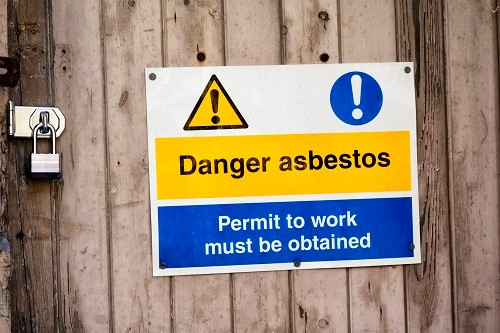Asbestos-related diseases claim the lives of around 5,000 people every year in the UK, making it essential that those in control of buildings containing the substance take adequate precautions to prevent it being damaged or disturbed.
Features
Asbestos essentials
Causing an average of 5,000 deaths per year in the UK alone, it is a well-known fact that exposure to asbestos can have a range of severe health consequences. Asbestos-containing materials (ACMs) are the most hazardous to health when disturbed or damaged as a result of maintenance or demolition work, as this allows the fibrous mineral to become airborne and potentially inhaled, increasing the risk of asbestos-related diseases, such as lung cancer, mesothelioma and asbestosis.
What are the legal requirements for duty holders in terms of managing the risks posed by asbestos?
Despite being classed as a hazardous substance when disturbed, asbestos is actually excluded under the Control of Substances Hazardous to Health Regulations (COSHH) 2002. In fact, Regulation 5 of COSHH specifically states that the requirement to carry out COSHH assessments – in addition to all employer duties regarding assessment, controls, monitoring and surveillance – does not apply to asbestos.

This is due to the fact that the substance comes with its own set of regulations – the Control of Asbestos Regulations (CAR) 2012 – which are actually considered to be stricter due to the highly hazardous nature of the substance.
If you own, occupy, have access to or manage the maintenance and repair of premises which may contain asbestos, you are classed as the ‘duty holder’ and are legally required under Regulation 4 of CAR 2012 to adequately manage this risk. Known as the ‘Duty to Manage’, the legislation applies to all non-domestic buildings, including commercial, public and industrial premises. Duty holders for all of these buildings must take the following steps to manage asbestos:
- Undertake an inspection to identify and maintain a register of asbestos-containing materials (ACMs) in the building Assess the risks associated with ACMs in the premises
- Devise a risk management plan for the building and any ACMs
- Make sure occupants of the building know the risks and precautions they need to take
- Keep the management of asbestos in the building under review.
With an estimated 500,000 buildings in the UK still thought to contain asbestos, it is a legal requirement under CAR 2012 for employers to inform all members of staff who may come into contact with ACMs in their day-to-day work about the precise location of the ACMs. In addition, employees must be fully trained and be able to respond competently and confidently in the event of them coming across any suspected or confirmed ACMs.
If ACMs are discovered on my premises, should removal be arranged with immediate effect?
In the event of unexpectedly disturbing an ACM, immediate action is required in terms of stopping work, closing/sealing the area and calling in a specialist to clear the site. However, there is often a misconception that merely identifying ACMs means they should be urgently removed, and this is not necessarily the case. In fact, just because asbestos may be present, it does not automatically mean that it is hazardous to health.
If sealed, undisturbed and found to be in good condition, legislation states that the asbestos present can be left alone and is not considered to be a health hazard, as the fibres should remain encapsulated. Removal of asbestos only tends to be an absolute requirement for materials found to be in bad condition, or, for items which are liable to ageing, damage and degradation, either as a result of normal building occupancy or planned building works.
Furthermore, refurbishment, demolition or maintenance work can all pose a risk of disturbing asbestos and increasing the risk of inhalation, which is why knowing the location of ACMs is fundamental to the long-term safe management of asbestos.
It is a legal requirement that, prior to the commencement of these types of work, duty holders locate ACMs and assess the level of risk they pose. Also, any recommendations for remedial actions must be documented, as it is often the case that managing ACMs in situ is less hazardous than removing them completely.
Is asbestos considered to be more hazardous to health in light of the increase in unoccupied premises over the course of the Covid-19 pandemic?
Given that CAR 2012 requires duty holders to manage asbestos to prevent or minimise exposure as far as is reasonably practicable, it is essential that both the short and long-term management of asbestos is not overlooked during the ongoing global pandemic. In fact, failing to regularly inspect, identify and manage ACMs will counteract your ‘Duty to Manage’ and could increase the risk of asbestos being disturbed and the resulting fibres subsequently being inhaled.
There is a reasonable chance that your scheduled asbestos reinspection or essential refurbishment works were due during one of the Covid-19 lockdowns and have had to be delayed as a result.
With the official roadmap to the easing of Covid-19 restrictions now in place, it is prudent for these inspections to be planned and completed to ensure that all ACMs are in a safe and compliant condition, allowing duty holders to safely reoccupy their buildings over the coming months.
Intrusive surveys should be undertaken prior to any planned building works,
which may include any adaptations to provide additional barriers/segregation for Covid-19 mitigation measures. Not only will this further reduce the risk of asbestos exposure among your workforce, it also ensures that the risk of the spread of Covid-19 (which, as a biological agent, has also been classed as a hazardous substance), is kept at a minimum.
James Dodgson is Commercial director, Asbestos SOCOTEC UK
FEATURES

Why line managers play a vital role in workplace wellbeing
By Marcus Herbert, British Safety Council on 03 September 2023
The behaviours of line managers can have a positive or negative impact on employee health, wellbeing and engagement, so it’s vital managers get staff feedback on whether their management style is supportive or negative, and have regular check-ins so workers can raise concerns about their wellbeing.

Watercooler Event to hone in on eight trends in employee health and wellbeing
By Claire Farrow, Make a Difference Events & Media on 15 April 2024
The free-to-attend Water Cooler Event at ExCeL London on 23–24 April will see more than 6,000 workplace experts coming together to explore the latest thinking, solutions and best practice for supporting and boosting employee wellbeing, diversity and workplace culture.

Sedentary working and how to combat the ‘sitting disease’
By Gavin Bradley, Active Working on 05 April 2024
Prolonged and excessive sitting poses a major risk to our health, but the Get Britain Standing campaign and On Your Feet Britain Day on 25 April are a great way of encouraging workers to sit less and move more.



